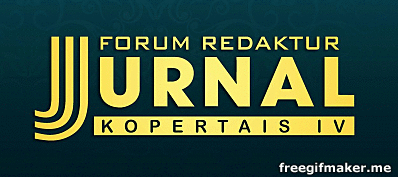REORIENTASI STRATEGI PENDIDIKAN ISLAM; SEBAGAI UPAYA PENINGKATAN MUTU SUMBER DAYA MANUSIA
Abstract
Islamic Education has an important task, namely how to develop quality human resources (HR) for Muslims to take an active role and still survive in the era of globalization. Hasan Langgulung provide educational strategies to improve the quality of human resources education strategies at the macro and micro as well as giving priority actions to be given by those in charge of education in the Islamic world, especially the government. Macro strategy consists of three main components: first, the purpose of Islamic education that includes the formation of the pious man and the pious society. Second, the basic foundation upon which Islamic education curriculum consists of eight aspects: integrity, unity, continuity, originality, scientific, practical nature, solidarity, and openness. Third, the priorities in the action which includes the absorption of all children who reach school age, the diversity of development paths, review the materials and methods of education, strengthening of religious education, administration and planning, and regional cooperation between countries in the Moslem world. Whereas strategy the micro consists of only one component only, namely tazkiyah al-nafs (soul cleansing). Islamic education should have the orientation to develop human resources. In this case presents three orientations Hasan Langgulung for Islamic education in building motivation/work ethic, discipline building work, and the internalization of values.
References
Adnan Putra, Ahmad S., “Strategi Pengembangan SDM Menurut Konsep Islamâ€, dalam Majalah Triwulan Mimbar Ilmiah, Universitas Islam Djakarta, Tahun IV No. 13, Januari 1994
Arifin, Muzayyin, Ilmu Pendidikan Islam, Jakarta: Bumi Aksara, 1993
Arifin, Zainal, Nuansa Teosentris Humanistik Pendidikan Islam; Signifikansi Pemikiran Hasan Langgulung dalam Konstalasi Reformasi Pendidikan Islam, STAIN Cirebon: Lektur-Jurnal Ilmiah Pendidikan Islam, Seri VIII/Th. Ke-5/1999
Assegaf, Abd. Rachman, “Membangun Format Pendidikan Islam di Era Globalisasiâ€, dalam Imam Machali dan Musthofa (Ed.), Pendidikan Islam dan Tantangan Globalisasi, Yogyakarta: Ar-Ruzz Media, 2004
Azra, Azyumardi, Pendidikan Islam; Tradisi dan Modernisasi Menuju Milenium Baru, Jakarta: Logos Wacana Ilmu, 2000.
Daradjat, Zakiah, Ilmu Pendidikan Islam, Jakarta: Bumi Aksara, 1996
-------, Pendidikan Islam dalam Keluarga dan Sekolah, Jakarta: Ruhama, 1995.
Departemen Agama RI, Al-Qur’an dan Tafsirnya, Jilid I, III, V, X, 1983/1984
Depdikbud, Kamus Besar Bahasa Indonesia, Jakarta: Balai Pustaka, 1999
Fattah, Nanang, Ekonomi dan Pembiayaan Pendidikan, Bandung: Remaja Rosda Karya, 2000
Fajar, A. Malik, Madrasah dan Tantangan Modernitas, Bandung: Mizan, 1999
-------, Reorientasi Pendidikan Islam, Jakarta: Fajar Dunia, 1999.
Hasan, Engking Soewarman, “Strategi Menciptakan Manusia yang Bersumber Daya Unggulâ€, dalam Jurnal Pendidikan dan Kebudayaan, Balitbang Diknas, No.039, Tahun ke-8, November 2002
Langgulung, Hasan, Asas-asas Pendidikan Islam, Jakarta: Pustaka Al Husna Baru, 2003
-------, Beberapa Pemikiran tentang Pendidikan Islam, Bandung: Al-Ma’arif, 1995
-------, Kreativitas dan Pendidikan Islam, Jakarta: Pustaka Al-Husna, 1991
-------, Manusia dan Pendidikan; Suatu Analisa Psikologi dan Pendidikan, Jakarta: Pustaka al-Husna, 1995
-------, Pendidikan dan Peradaban Islam, Jakarta: Pustaka Al Husna, 1985
-------, Pendidikan Islam dalam Abad ke 21, Jakarta: Pustaka Al-Husna Baru, 2003
-------, Peralihan Paradigma dalam Pendidikan Islam dan Sains Sosial Jakarta: Gaya Media Pratama, 2002
Copyright (c) 2016 Al Hikmah: Jurnal Studi Keislaman

This work is licensed under a Creative Commons Attribution 4.0 International License.
Hak Cipta dari artikel yang diterima oleh Al Hikmah: Jurnal Studi Keislaman bisa disebarkan untuk publik





